In a typical academic year at Weill Cornell Medical College, the annual White Coat Ceremony symbolically marks the launch of the incoming class’s journey into medicine. First-year students gather during their first week on campus for the tradition, which includes presentation of a short white coat and stethoscope to each of them by a member of the faculty. But for the Class of 2024, their first year of medical school was anything but typical.
With the country in the midst of the COVID-19 pandemic, and vaccines still on the horizon, instruction for the incoming class took place online for the Fall 2020 semester. A virtual matriculation ceremony kicked off an unusual academic year and honored the students’ commitment to becoming physicians, scientists and leaders in health care, and offered the chance to reflect on this new chapter of their lives, happening at such a historic time.
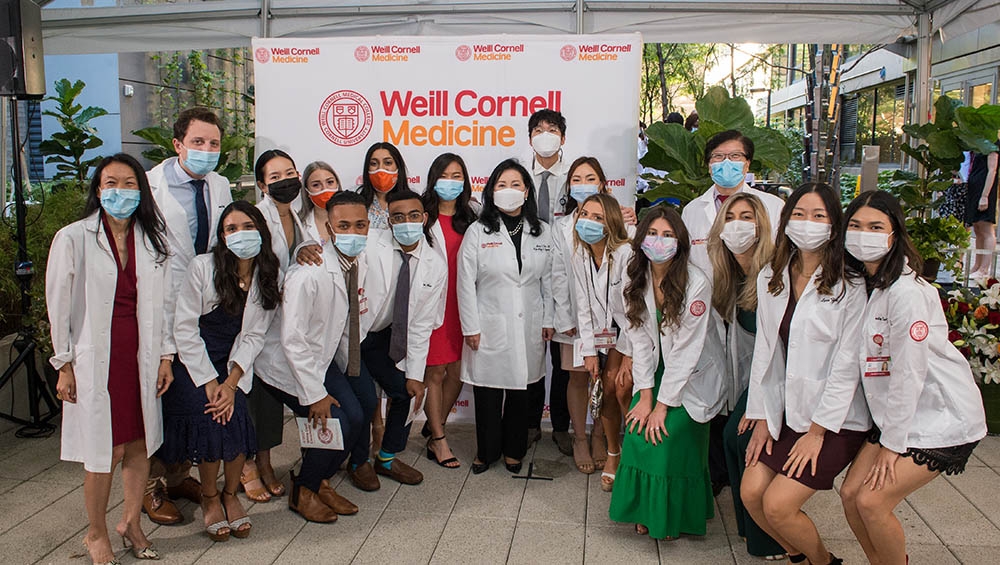
Drs. Yoon Kang, Mary E. Choi and Augustine M.K. Choi celebrate with the Class of 2024 at the White Coat Ceremony on Sept. 24, 2021. All photos by Studio Brooke.
On Sept. 24, after a year highlighted by so many virtual events, the Class of 2024 finally celebrated their medical school journey with their own White Coat Ceremony—hosted in person. They were joined by 11 faculty members, who helped students don their short white coats, on The Starr Foundation-Maurice R. Greenberg Conference Center Terrace in the Belfer Research Building for an outdoor ceremony while their family and friends watched the livestreamed event at home.
“Unlike at traditional white coat ceremonies, we are inducting you into your chosen career path when you’re already well on your way,” said Dr. Augustine M.K. Choi, the Stephen and Suzanne Weiss Dean of Weill Cornell Medicine. “Despite the unconventional start to your medical school studies, you are receiving the best training possible from leading experts in their field. You will leave Weill Cornell well prepared to take on the health care challenges we face today and will make an impact. Your experience— though different from others before or after you—may even prove to be a strength.”
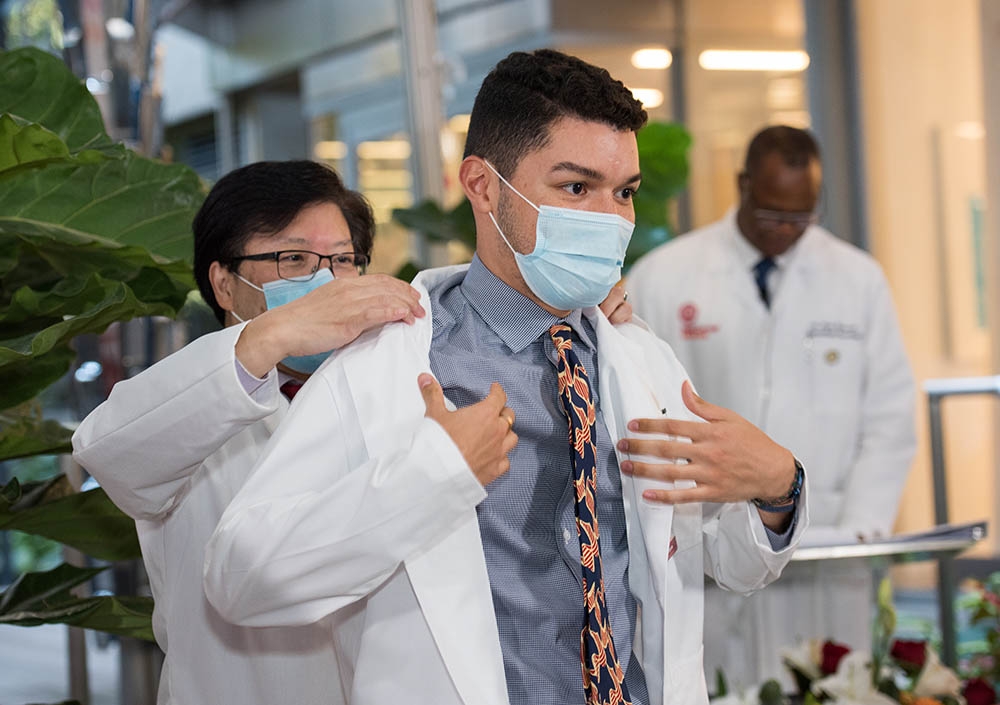
Second-year medical student Rafael Almanzar receives his short white coat from Dean Choi.
Indeed, the students found unique and meaningful ways to not only engage with each other but also with the greater community. They participated in summer research projects, volunteered with institutional organizations such as the Weill Cornell Center for Human Rights and got involved with community vaccination programs. Their interests and passions reflect their range of backgrounds and experiences: women comprise nearly half of the class, 29 percent are from underrepresented groups in medicine and 22 percent are first-generation college students.
“Due to the uncertainties of the COVID-19 pandemic, the start of your medical school career was quite different than what you may have imagined,” said Dr. Yoon Kang, senior associate dean for education at Weill Cornell Medicine. “As first-year medical students during an extraordinary time in the nation’s social and political history, you are in a unique position to reflect on the struggles we have faced—the challenges in health care delivery, health disparities, social and racial injustice, and economic hardships—and use these transformative experiences to better inform the care you will provide your patients in the future.”

Students cheer on their classmates at the outdoor White Coat Ceremony on Sept. 24, 2021.
During her keynote speech, Dr. Mary E. Choi encouraged students to take great care in selecting a specialty, sharing her own experiences and noting that “it’s one of the biggest decisions you’ll make in medical school, and one that will impact your life in many different ways.”
“Each of you will have your own reasons for the direction you choose to take, and each of those reasons will be perfect for you,” said Dr. Choi, a professor of medicine in the Division of Nephrology and Hypertension at Weill Cornell Medicine and a distinguished physician-scientist. “Still, no matter what decision you make, I guarantee there will be unexpected twists and turns in your career that draw on your expertise and test it to the limits. Just consider all that we have learned with the COVID-19 pandemic.”
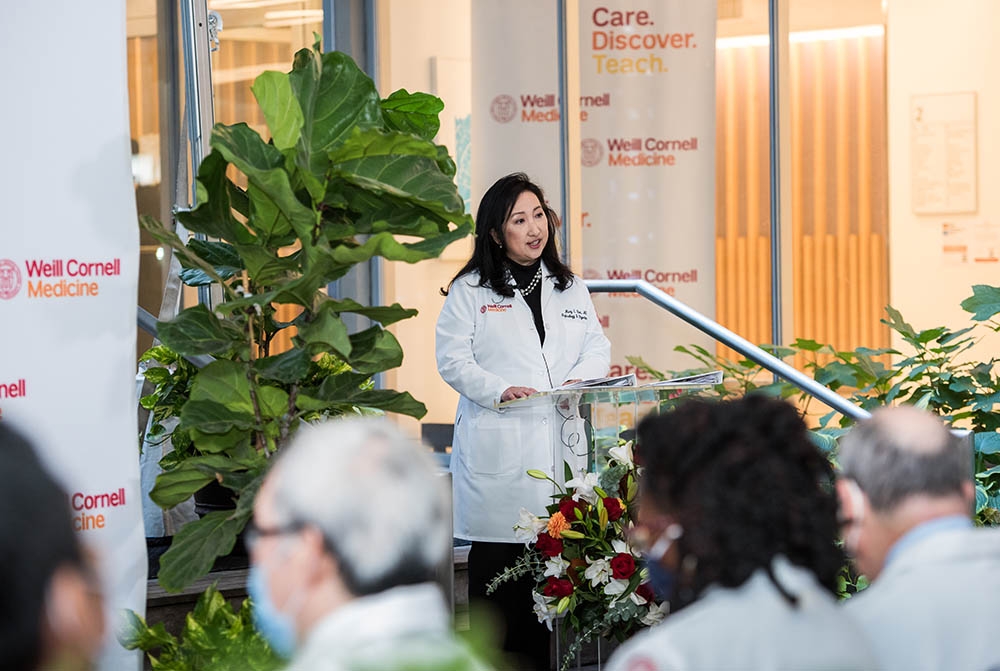
Dr. Mary E. Choi delivers the keynote address at the White Coat Ceremony on Sept. 24, 2021.
For the Weill Cornell Medical College Class of 2024, the challenges of the past year have offered opportunities to pursue their passions, connect with their peers and their communities in distinctive ways, and find greater meaning in their chosen field of medicine. These four students shared their experiences.
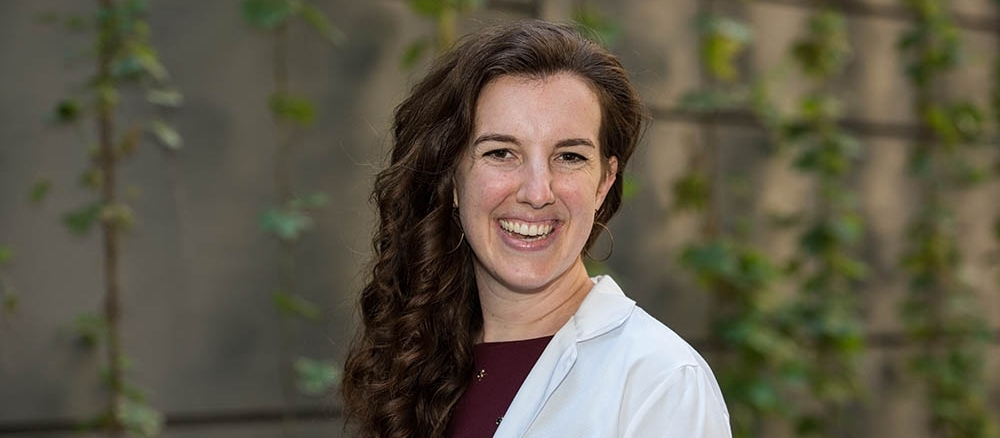
Sheridan Bowers
When Sheridan Bowers, 26, learned that her first semester of medical school was going to be held entirely online, she worried it could be difficult for her Weill Cornell Medical College class to feel as connected as they might if they were on campus in person. But over several months of Zoom classes; game nights; and volunteering for organizations that went remote, such as the Weill Cornell Community Clinic—where Bowers is a board member—and the Weill Cornell Center for Human Rights, the class of 2024 forged a bond out of their unique circumstances. When they convened for some in-person classes in January, many were meeting for the first time.
“We were so excited to be together in-person finally and to make up for lost ground,” Bowers said. “Our class came together in solidarity because we hadn’t gotten the normal experience that other classes have gotten.”
Now her class’s vice president, Bowers has been committed to fostering and instilling a sense of community and advocating for her class as they navigate this uncertain time.
“I really want to help to encourage our class to shape our community and form a supportive culture,” Bowers said.
This fall, the class of 2024 realized another milestone at a lecture of their Brain and Behavior unit—the first time the whole class was together for a lecture.
“The energy was palpable. It felt like a bunch of third-graders on the first day of school, seeing their friends for the first time in weeks,” Bowers said. “I remember sitting there, watching the lecture and having it hit me that this is what I envisioned medical school to look and feel like for the many years I’ve been working toward this.”
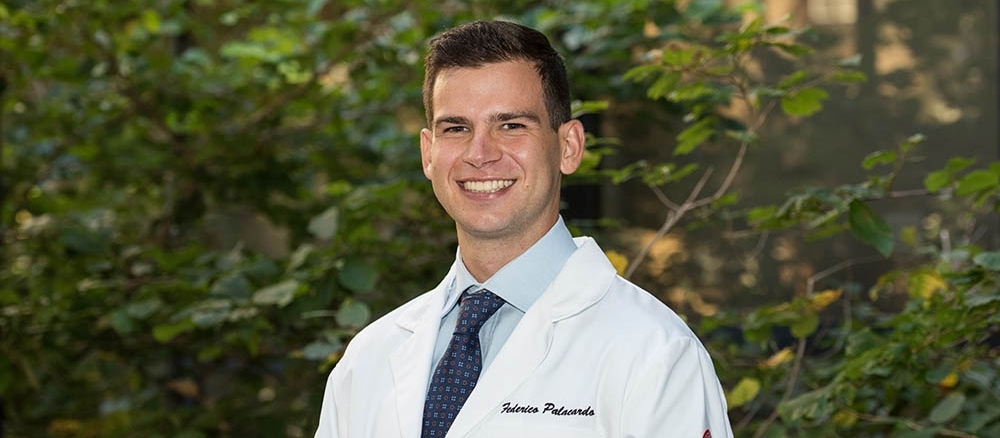
Federico Palacardo
When Federico Palacardo, 23, began medical school remotely in fall 2020 at Weill Cornell Medical College, he didn’t imagine there would be much to get involved in outside of studying.
“I came into medical school thinking that the extracurricular days of undergrad were done, especially during a pandemic, and that I was just going to study and learn,” he said.
But Palacardo soon found many opportunities. He joined the Weill Cornell Center for Human Rights, first online and then in-person. There, he helps schedule medical and psychological evaluations for people seeking asylum in the United States. “It’s been meaningful to help those seeking asylum, particularly in this challenging pandemic time.”
He has assisted on two research studies, one by Dr. Parag Goyal and Dr. Justin Kingery on COVID-19 recovery—studying if patients who were hospitalized with the disease had persistent symptoms months later. Another is a survey of water practices and waste management in Tanzania with the Cornell Water Society, led by Dr. Paul Christos and Dr. Madelon Finkel. Palacardo has also helped run events for White Coats for Black Lives, including organizing a summer book club discussion of Isabel Wilkerson’s Caste. And, he worked at a vaccine site with Stop the Spread, a screening effort to detect preventable illnesses like diabetes before they become chronic.
Palacardo is grateful he could get involved with these extracurriculars while learning was remote, because they represent an integral part of his time in medical school. “I’ve gotten to learn a lot of skills beyond hard facts of medicine, like the ability of doctors to reach patients and build trust—which is especially needed for asylum evaluations—and become involved in the Weill Cornell and larger community in a way I couldn’t have expected.”
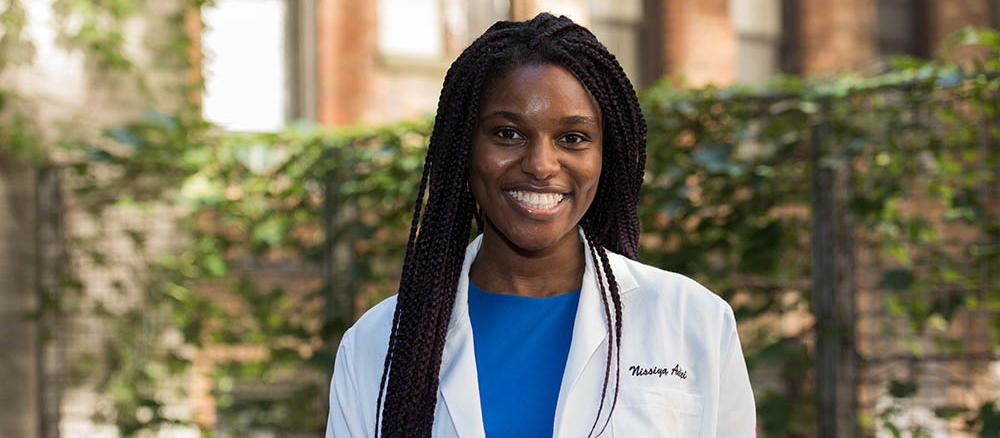
Nissiya Adjei
Nissiya Adjei, 24, was eager to get involved in the medical response to the pandemic when she came to Weill Cornell Medicine’s campus in the winter after spending her fall semester in her family’s home near Chicago. Since then, she has volunteered at vaccination sites in Harlem and Jamaica, Queens.
“It was very important to me to be in these environments where COVID-19 had disproportionately impacted people,” the second-year Weill Cornell Medical College student said. In addition to helping prepare syringes, Adjei has spoken with patients at the sites who have concerns about the vaccine and helped educate them about its ability to prevent serious illness.
“I’ve been able to talk to people who have understandable concerns and tell them that the vaccine is rooted in science, and it is here to help you,” she said.
Adjei is also involved in a research study assessing the relationship between health disparities and mothers feeling adequately prepared caring for newborns after discharge from the neonatal intensive care unit.
“Health care disparities have always existed, but the pandemic has highlighted them,” Adjei said. “It’s also reaffirmed my commitment to practicing medicine and helping to create spaces where patients feel comfortable enough to discuss their experiences.”
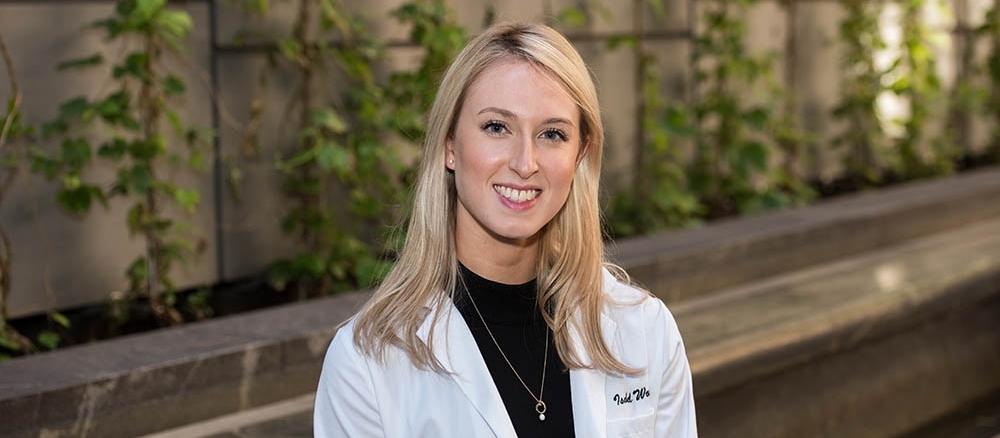
Isabel Wolfe
In the fall of 2020, Isabel Wolfe, 24, like her classmates in Weill Cornell Medical College’s Class of 2024, was completing her first semester of medical school remotely. From her family’s home in Falmouth, Maine, she was able to get involved with a study led by Dr. Malavika Prabhu investigating the effects of earlier hospital discharge in mothers who had just given birth, owing to COVID-19 precautions, and whether that could become a new standard of care after the pandemic without compromising outcomes. For the study, Wolfe and other medical students collected data from hundreds of patient charts.
“It gave me a window into COVID in my small town in Maine, far away from the throes of the pandemic in New York,” Wolfe said. She is also beginning work on another study led by Dr. Prabhu that investigates timing of vaccinating mothers during pregnancy to ensure that optimal level of antibodies are passed on to the baby when they are born.
Although being a medical student during the pandemic has had many challenging moments, Wolfe feels a lot of pride entering the profession during such a unique and important time. “It has felt like we are part of something bigger than ourselves,” she said. “Entering the clinical space, getting the vaccine and joining in the effort to help patients has added a lot of meaning to this journey.”
